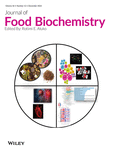Catechin, rutin and quercetin in Quercus mongolica Fisch leaves exert inhibitory effects on multiple cancer cells
Abstract
We aimed to identify anti-tumor agents in Quercus mongolica Fisch (QMF). Bioactive compounds in QMF leaves, which were extracted using ethanol as a co-solvent. Five point zero six grams of flavonoids were obtained from 100 g of QMF leaves. Catechin (18.4%), rutin (6.3%), ellagic acid (34.9%), quercetin (5.1%) and kaempferol (20.6%) are the main ingredients of the extracts and were further purified by HPLC. CCK-8 cell proliferation assay showed that catechin and ellagic acid exerted strong inhibitory effects on the proliferation of all cancer cells with lower IC50 values against MCF-7 human breast cancer cell lines, SMMC-7721 human hepatocellular carcinoma cells, HeLa human cervical carcinoma cell lines and SKOV3 human ovarian carcinoma cell lines (p < .05). Catechin, rutin and quercetin induced a higher rate of apoptosis and inhibited all cancer cell proliferation by inducing the G0/G1 phase and G2/M phase arrest (p < .05). However, ellagic acid induced tumor cell death, not through apoptosis and there may be other molecular mechanisms. High levels of catechin and ellagic acid in QMF can be developed as potential drugs to treat different types of cancer cells.
Practical applications
Quercus species have been widely studied because of their antioxidant, anti-inflammatory, antimicrobial, and anti-tumor properties. Bioactive compounds in the leaves of Quercus mongolica Fisch have high levels of catechin and ellagic acid, which exert significant inhibitory properties on the proliferation of various types of cancer cells. Therefore, the bioactive compounds may be potential natural drugs in the prevention of cancer development and progression.
CONFLICT OF INTEREST
The authors declared that they have no conflict of interest.
Open Research
DATA AVAILABILITY STATEMENT
The data that support the findings of this study are available from the corresponding author upon reasonable request.




